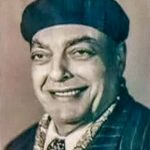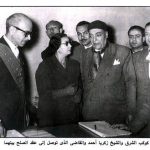Amar Foundation presents: Min Al-Tarikh
Mustafa Said: Welcome to a new episode of Min Al-Tarikh in which, together with his highness Frederique Lagrange Pasha, we resume our discussion about Ahl El-Hawa.
Frederique Lagrange: The second legendary life performance of Ahl El-Hawa is the concert of 1956.
M: The first Thursday in May 1956 in El-Uzbakiyya theatre.
F: This concert in 1956 is the concert in which she sang Ra’ El-Habeeb in the first interval, Daleeli Ihtar in the second in which she was in her best as she improvised a lot, and in the third interval she sang Ahl El-Hawa.
M: Again, The last interval and Ahl El-Hawa.
F: Yes, again the last interval and Ahl El-Hawa, but a full hour this time. For a song to last for an hour was a very common thing in the 1950’s and 1960’s. This was not, however, the tradition in the 1940’s. Her songs reached even an hour and a half in the 1960’s, but before, she would have finished a song in a maximum duration of 40 minutes. Ahl El-Hawa lasted for an hour. How could she manage to extend it? First, she returned to the idea of improvising in the first part “Ahl El-Hawa ya Leel, Fatou Madagi’hum, wetgamma’u ya leel, sohba ,wana ma’hum” and she surprised the audience when she went to the high notes. She sang the first part and improvised in it.
M: The entry of the song, and she modulated to Bayyati from the fifth as she used to doing.
F: Here, the listener would have thought that she would go to the next part, but she decided to surprise them, and she rose to the high notes. She was about to go to “Yetawwilouk ya Leel”, yet she returned to “Ahl El-Hawa”.
M: Isn’t it the part which contained “wana wana wana”?
F: Yes, this is it. This the concert of “wana wana”, “Wana wana wana wana ma’hum”. She tried it once “Wana wana Wana Ma’hum” and naturally the audience reacted to it and she laughed so that even one hears Om-Kolthoum’s laughter as a reaction to the audience reaction, and she repeated “Wana Wana Wana”. This is the first beautiful thing in this recording.
“Listen to the first part of Ahl El-Hawa 1956”.
F: And by the end, “Ya Leel”. “Nas min ulubha t’ool ya leel”, for almost 20 minutes, Layali in Segah and in Bestenegar. She doesn’t make one feel that she’s improvising in Bestenegar, rather she improvises in Saba, yet we know that she would end on Segah and she already goes to Segah at the end. The spirit of Bestenegar dominates all this beautiful scene.
M: Out of these 20 minutes, I’d like to show part of the recording before we play the whole recording. By the end of this excerpt, Om-Kolthoum goes from Saba to Segah. There’s a polyrhythmic part here: Ibrahim Afeefi plays in Wahda rhythm, and he goes to Maqsoum when she reverts to Saba, during all this, Mohammed Abdu Salih gives Bamb with his qanoun no matter what Afeefi plays. Mohammed Abdu Salih with his Qanoun gives Bamb.
“Listen to an extract of the final part of the song”.
F: By the way, I remember an extremely strange speech of Mohammed Abdel-Wahhab after the death of Om-Kolthoum in which he talked about the rehearsals of We-darit El-Ayyam with Om-Kolthoum.
M: that she doesn’t sing “Ya Leel” and such nonsense.
F: He claimed that Om-Kolthoum used to condemn the Egyptian singers of saying “Ya-Leel ya ain” in the middle of their singing as a kind of cheap begging of the satisfaction of the audience. When I heard this from Mohammed Abdel-Wahhab, I was really stunned: We-Darit El-Ayyam was in 1970, yet in 1959, only 11 years before it, Om-Kolthoum was still singing “Ya Leel ya Ain”, and she wasn’t only singing “ya Leel ya Ain”, yet she sang it for long times.
M: Also, later on there was Shams El-Aseel and others. What Abdel-Wahhab said about that was not convincing really. There may have been another issue,
F: especially that “Aini aini ‘al ash’een”, this part doesn’t remind us of the Layali at all. It has no relation to “ya leel ya Ain”. Very strange claim really.
M: God knows the circumstances in which he claimed this anyway, we do not know. It wasn’t convincing anyway.
F: The idea is that Ahl El-Hawa was like a salutation from the 1950’s developed Arabic song to the tradition of “Ya leel ya Ain” which was essential in the Egyptian classical singing.
M: We reach the conclusion of our episode. We leave you with Ahl El-Hawa about which the talk never stops. Let’s listen to Bayram, Zakariyya and Thouma, Thursday, 3 May 1956, also Ramadan, but this time, they went on as they wanted.
“Listen to the full recording of Ahl El-Hawa 1956 version.”.
The End.
- 221 – Zakariyya Ahmed – 12 (1/9/2022)
- 220 – Zakariyya Ahmed – 11 (1/9/2022)
- 219 – Zakariyya Ahmed – 10 (11/25/2021)
- 218 – Zakariyya Ahmed – 9 (10/26/2021)
- 217 – Zakariyya Ahmed – 8 (9/24/2021)
- 216 – Zakariyya Ahmed – 7 (9/4/2021)
- 215 – Zakariyya Ahmed – 6 (8/28/2021)
- 214 – Zakariyya Ahmed – 5 (8/6/2021)
- 213 – Zakariyya Ahmed – 4 (6/26/2021)
- 212 – Zakariyya Ahmed – 3 (5/27/2021)
- 211 – Zakariyya Ahmed – 2 (5/1/2021)
- 210 – Zakariyya Ahmed – 1 (4/28/2021)
- 209 – W-al-Lāhi lā astaṭī‘u ṣaddak 2 (4/6/2017)
- 208 – W-al-Lāhi lā astaṭī‘u ṣaddak 1 (3/30/2017)
- 207 – Bashraf qarah baṭāq 7 (3/23/2017)


